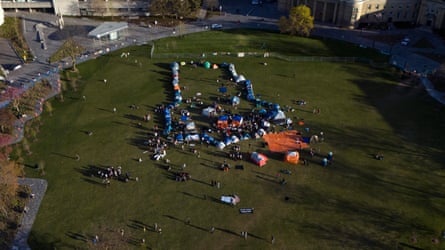Quebec’s premier has said police should begin dismantling an “illegal” week-long pro-Palestinian encampment at Montreal’s McGill University, as students at Canada’s largest universities ramp up demands that the schools sever relationships with groups linked to Israel.
“The encampment is illegal,” François Legault told reporters. “The law must be respected, so I expect the police to dismantle these illegal campsites, which is what McGill has requested.”
McGill University, the site of the country’s largest protest camp, has requested police intervention, but as of Friday no action had been taken to remove the demonstrators.
Earlier in the week, a Quebec court rejected an injunction request from two students to move the camp to a different location. The students told the court the current location of the protest interferes with their ability to safely attend class.
In her ruling, Justice Chantale Masse said the students failed to show “irreparable harm” and that to remove the protesters would “significantly” affect their right to freedom of expression.
On Thursday, counter-demonstrators waving Israeli flags faced off against the encampment, separated by a line of police. Police said no arrests were made.
Students have also set up encampments at three post-secondary schools in British Columbia and one at the University of Ottawa. Police have been present at all of the demonstrations, but unlike in the United States, where more than 2,000 have been arrested, no arrests have been made in Canada.
On Thursday morning, students at the University of Toronto breached a fenced-off area of the campus and erected dozens of tents, disregarding a warning from the school earlier in the week that any camp would be seen as “trespassing”.

Organizers say they intend to remain on the school grounds until the university discloses its investments, divests from any that “sustain Israeli apartheid, occupation and illegal settlement of Palestine”, and ends partnerships with some Israeli academic institutions.
Israel says it does not participate in apartheid and that its assault on Gaza does not constitute genocide.
Sandy Welsh, vice-provost of students at the University of Toronto, said the school would permit the protesters to remain if their demonstrations “remain peaceful”, backing off a previous pledge to remove the encampment that evening.
“Our concerns about safety are increasing,” Welsh said in a statement. “You have called for others to join your protest and the numbers have grown significantly since this afternoon. We are concerned that many of the individuals present may not be U of T students or other members of the U of T community.”
Asked to comment on the encampments, the office of the prime minister, Justin Trudeau, pointed to a statement he made on Tuesday, saying: “Universities are places of learning, they’re places for freedom of expression … but that only works if people feel safe on campus. Right now … Jewish students do not feel safe. That’s not right.”
Some Jewish groups have accused the protesters of being antisemitic; however, organisers deny that charge, noting that some protesters are Jewish.
Reuters contributed reporting
